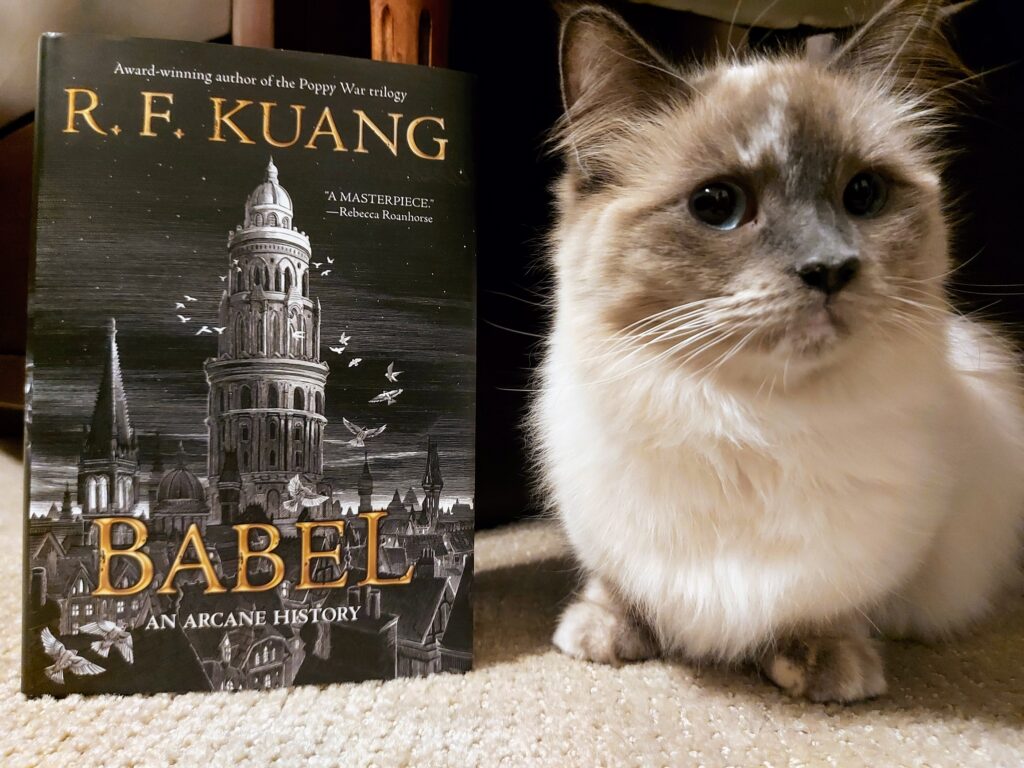Babel by R. F. Kuang

Well, my 2023 reading is off to a good start. I was not sure what to expect of Babel, but it was one of Indigo’s picks for best books of 2022, which intrigued me enough to read it. I enjoyed every second of reading this novel. The novel’s full title is Babel or The Necessity of Violence: An Arcane History of the Oxford Translators’ Revolution. If you do not mind a bit of magic mixed into your historical fiction, I highly recommend that you give this novel a shot.
Set primarily in England in the 1830s and 1840s, Babel is a Dickensian story that follows the life of Chinese scholar Robin Swift, beginning with the death of his mother from a cholera outbreak in Canton. Robin becomes the ward of Professor Lovell, a white Englishman who is actually his biological father but who does not acknowledge Robin as his son. Robin is brought to London to undergo a rigorous tutelage of Latin, Ancient Greek and Chinese. Lovell is an exacting guardian. At one point, he viciously beats Robin when Robin loses track of time reading and is late to a lesson. Anytime Robin dares to stand up to him, his response is to accuse Robin of ingratitude for the opportunities Lovell has given him.
Robin matriculates to Babel, the Royal Institute of Translation located in Oxford. If you have never heard of the Royal Institute of Translation, that is because it does not exist outside of fiction. This is where the magic comes in: Babel is the world’s center for translation and silver-working, which is the art of enchanting silver bars using match-words in different languages. This will make sense when you read the novel. The enchanted silver bars have the potential for being used for all kinds of purposes, but they are mostly used by the wealthy to make life more convenient, or by the navy to make their ships faster and their weapons more deadly. Imagine the industrial revolution without engineering ingenuity but driven by magic instead. Babel has made Britain the most powerful nation in the world, as it really used to be before the sun did set on the British Empire.
At Babel, Robin becomes best friends with the other students in his year: Ramy, who is Indian, Victoire, who is Black, and Letty, who is white and, unlike the others, from a wealthy family. It becomes quickly apparent to Robin, Ramy and Victoire that they, as non-white students, have been brought to Babel to help expand Babel’s language database, which has primarily relied on the European languages such as French, German and Spanish, but needs new languages to keep functioning properly, such as Robin’s Mandarin and Cantonese, Ramy’s Urdu, Arabic and Persian, and Victoire’s Creole. Robin and his friends remind me of the group from Donna Tartt’s A Secret History, except they are more likeable and sympathetic.
For Robin, Babel is an idyllic centre for learning, but a chance encounter with an operative from the Hermes Society, an organization that is working to stop Britain’s imperial expansion, leads Robin to the realization that working for Babel means he is betraying his motherland, and every other nation that has been colonized and exploited by the British. Babel masterfully explores colonization and racism through the eyes of the colonized. Robin’s character development throughout the novel is remarkable as he grapples with his feelings of being satisfied with his comfortable life as a scholar, even if it means kowtowing to his white oppressors, and being afraid to help the Hermes Society. But everything comes to a head when Britain looks to go to war with China over its stockpile of silver, and Robin does something that will set his life on a very different path that leads him to fighting back against colonialism.
Babel is a thick book, and this fictional version of the British Empire, which relies too much on silver, is thoroughly imagined by Kuang. Not only is Robin’s character so well developed, but so are his friendships with Ramy, Victoire and Letty. You will be utterly devastated and heartbroken by what Kuang puts them through, but in the context of the white colonizer’s inability to emphasize with the people that they exploit, the events in the novel are inevitable. Do not let this put you off, though! Babel is a brilliant piece of historical fiction that I cannot recommend enough.